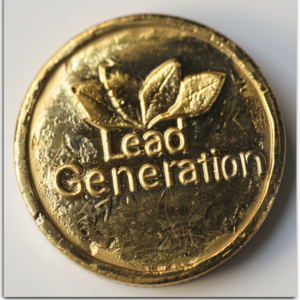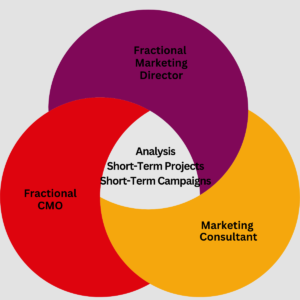
“Small businesses using consultants see a 50% increase in leads and a 30% increase in sales, on average.”
Are you a CEO or COO of a small to medium-sized business, feeling overwhelmed by the marketing challenges your company faces? You’re not alone. With so many options for marketing help, it can be hard to know where to begin. Today, we’re diving into a common query: What is the difference between a marketing consultant and a fractional CMO? Understanding these distinctions between a marketing consultant’s duties and a fractional CMO job description can help you make the best choice for your business.
Marketing roles can vary significantly, and knowing whether you need a fractional CMO or a marketing consultant is crucial. In this article, we’ll explore their roles, how they get paid, and what they bring to the table, so you can make an informed decision for your business’s marketing needs.
What is the difference between a marketing consultant and a fractional CMO?
A marketing consultant and a fractional CMO both bring valuable expertise to your business, but their roles, involvement, and impacts are quite different.
A marketing consultant is typically hired for short-term projects or narrowly specific challenges. They provide expert advice, develop strategies, and manage campaigns on a project basis. Their involvement is often external, providing specialized insights without becoming deeply integrated into your team.
In contrast, a fractional CMO is a part-time executive who becomes an integral part of your business. They take on the strategic leadership of your marketing department, offering long-term guidance and overseeing the implementation of comprehensive marketing initiatives. A key difference is that they are hands on in conducting lead generation whereas a consultant would not. This deeper level of engagement helps align marketing efforts with your overall business goals. The deeper level of engagement also ensures that your business is far better when the fractional CMO leaves than when they got started whereas a marketing consultant only leaves a footprint on the specific project on which they assisted.

: “82% of businesses that hired a marketing consultant reported a positive ROI within six months.”
What is the role of a marketing consultant?
A marketing consultant is a professional who provides expert advice and strategies to improve your business’s marketing efforts on a narrow basis. They don’t take a holistic approach to your marketing efforts. They typically work on a project basis, bringing specialized skills to specific challenges or campaigns. Think of them as merely participating in one stage of a meal, rather than all 9 courses like a fractional CMO does who sees the entire view of your marketing needs.
The term fractional marketing consultant? This term refers to consultants who work part-time with multiple clients at the same time, offering their expertise but as an independent contractor and without the full-time hire scenario. They are ideal for businesses needing occasional marketing insights without the overhead of a full-time employee.
Marketing consultants can help with:
- Conducting market research
- Developing marketing strategies for a specific project
- Managing specific marketing campaigns
- Providing insights into market trends and consumer behavior
How do marketing consultants get paid?
Marketing consultants typically charge based on the scope and duration of the project. Their pay structure is very similar to that of the fractional CMO though their fees are about 20-40% less. Their payment structures can include hourly rates, project fees, or retainers. Here’s a quick breakdown:
Hourly Rates: Ideal for short-term projects or consultations.
Project Fees: A set fee for a specific project, such as a product launch or rebranding effort.
Retainers: An ongoing fee for continuous support over a period, often used by businesses needing regular marketing assistance without a full-time hire.
What is the role of a fractional CMO?

A fractional CMO’s primary responsibility is to garner attention for your business’ product/service and to convert that attention into qualified leads
A fractional CMO is a part-time executive, who is a interim member of the C-suite of executive, who takes on the strategic leadership of your marketing department. Unlike a consultant who focuses on specific projects, a fractional CMO integrates deeply with your business, providing long-term strategic direction and overseeing the implementation of marketing initiatives. Fractional CMOs oversee all things marketing. They not only see the 10,000-foot view, the get in and manage the 1,000-foot scenes as well to ensure that everything is handled as effectively as possible in order to meet the goals at set by the CEO.
Fractional marketing manager, Fractional marketing director, and fractional marketing services all fall under the umbrella of fractional CMOs, offering various levels of strategic leadership and management based on your business’s needs. The services are provided by these fractional professionals. The fractional marketing manager and the fractional marketing director get more into the execution of the campaigns and initiatives than the oversight and strategic planning that the fractional CMO is responsible for.
What is fractional content marketing?
Fractional content marketing involves a marketing professional specifically focusing on the content creation aspect of your marketing strategy. Unlike a fractional CMO who oversees and formulates marketing strategies, a fractional content marketer is dedicated to the hands-on development and management of your content. This includes:
- Creating and managing a content calendar
- Developing content that aligns with your brand and business goals
- Ensuring that all content efforts contribute to your overall marketing strategy
A fractional marketing manager or fractional marketing director specializing in content can help streamline your content marketing efforts, ensuring that every piece of content works towards your business’s broader objectives. These professionals can be part of the broader fractional marketing services you engage, providing specialized expertise without the need for a the full-time benefits and expenses that go along with that.

learn more about specific responsibilities of marketing consultants and fractional CMOs.
Key Differences Between a Marketing Consultant and a Fractional CMO
- Scope of Work: Marketing consultants work on specific projects, while fractional CMOs provide ongoing strategic leadership and mastery of the entire marketing process.
- Level of Engagement: Consultants are external experts, while fractional CMOs become part of your team, working closely with your staff to implement strategies.
- Duration and Commitment: Consultants are project-based, whereas fractional CMOs have a long-term commitment to your business’s marketing success.
- Expertise and Experience: Fractional CMOs bring a high level of strategic vision and leadership, making them suitable for businesses looking for comprehensive marketing oversight.
Benefits of Choosing a Fractional CMO
- Strategic Leadership: A fractional CMO provides strategic direction that aligns with your business goals, ensuring your marketing efforts are focused and effective.
- Team Integration: They work closely with your existing team, fostering collaboration and ensuring that strategies are executed smoothly. They can also help in creating your ideal dream team as well.
In summary, understanding the difference between a marketing consultant and a fractional CMO is key to making the right choice for your business. While marketing consultants provide valuable project-based expertise, a fractional CMO offers ongoing strategic leadership and integration with your team and a general mastery over all things marketing which means any and everything related to getting your company the attention it needs in order to grow. Consider your business needs, goals, and the level of support required to determine the best fit.
Ready to take your marketing to the next level? Contact Invictus CMO today to learn how our fractional CMO job description can align with your business needs and help you achieve your marketing goals.
Exclusive Guaranteed Results: At Invictus CMO, we stand out by offering a unique guarantee on our lead generation services. This ensures you get measurable results and an unparalleled return on your investment.
Schedule a CEO Flash Focus with us today: a preliminary focused and high-level 15–20-minute meeting with CEOs to highlight their main challenges. No selling. Just solutions.


